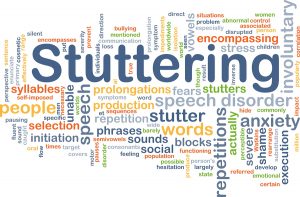by Danielle Huffman

Imagine you are out at a restaurant with your family. The waiter is taking each person’s order until they come to you. You know exactly what you want from the menu and start to tell the waiter, but something happens. You cannot seem to get your words out, as if they got stuck in your throat. You might be making choking noises as you run out of air, or bobbing your head and tensing your face. When you do manage to speak, you start repeating the same sound or the same word repeatedly without meaning to. Your order may be full of words such as “um” or “like”. You are embarrassed that you are taking too long and delaying everyone else’s food. The waiter looks uncomfortable as he tries to predict your utterance and hurry you along. To a person who stutters, this situation may be all too familiar.

What is Stuttering?
My name is Danielle Huffman. I am a first-year graduate student in George Washington University’s Speech-Language Pathology Masters Program. I received speech therapy services from ages 5 to 13 for stuttering. You may be thinking, what is stuttering? Stuttering is a speech disorder defined by involuntary repetitions and prolongations of sounds/syllables/words/phrases, involuntary silent pauses or blocks, and more effortful and strained speech. Every person has some degree of disfluencies when they speak; however, stuttering disfluencies differ by lasting longer and occurring more frequently. Stuttering behaviors may also be accompanied by secondary characteristics, often movements that the person believes will assist them in “getting their words out”. As a child, my stutter was often accompanied by tugging at my ear. Even as an adult, I may still bob my head or have facial grimaces when stuck in a block.
The Impact of Stuttering
Stuttering can also have a severe impact on the person’s functioning and emotional state. I was bullied by other students in grade school for my speech. My stuttering made me different and weak to my peers. Teachers and staff complained to my parents during IEP meetings that my speech grew more disfluent when upset, nervous, or excited. The embarrassment of raising my hand in class, the teasing from classmates, and the impatience of my educators forced me to almost complete silence around age 9 or 10. I was lucky to have my mother as my advocate and eventually be referred to fluency specialist John Sloan at the Hearing and Speech Agency of Baltimore, who is still my mentor and colleague today. Without their assistance, love, and support; I am unsure of what my speech would be like today.
How Can You Support a Person with a Stutter?
As an adult, my stutter is infrequent but can still occur at times of stress or high emotion. I am often asked by people, “What can I do to make you or someone else who stutters comfortable?”. My best answer is there is no universal answer. The best solution is to ask the person who stutters, as what makes them comfortable can differ from someone else’s preferences. For example, some people who stutter are relieved when others finish their sentences for them, while others like myself feel rushed and unimportant when others do so. It all depends on the person and their experience as a person who stutters. Another piece of advice I can offer is, we are not all like “The King’s Speech”. Not all of us have seen it, or even would like to see it. Although the movie is a masterpiece and reflects what it is like for a person who stutters, that movie is a reflection of one person who stutters. And if you are someone who raves about this movie for its impact in the stuttering community, remember it is never okay to be selective about who support; you are either for everyone in our community or not with our community at all. You cannot praise “The King’s Speech” for its depiction of stuttering, and then ridicule Joe Biden as he stutters through his speech on television.
Closing Thoughts
When others slow down and listen, they realize we have a lot to say. Stuttering does not make us weak or unintelligent. It will always be a part of us, but it does not define us. We are a strong community of mothers, daughters, sisters, brother, fathers, sons, students, and professionals who simply need a few more minutes than you to speak.
Resources
Stuttering Association for the Young
Back to School Self Advocacy Tips for Those Who Stutter
Classroom Advocacy for Those Who Stutter
Stuttering Resources For Adults
Check out my resource hub for more information about educational rights and advocacy.

